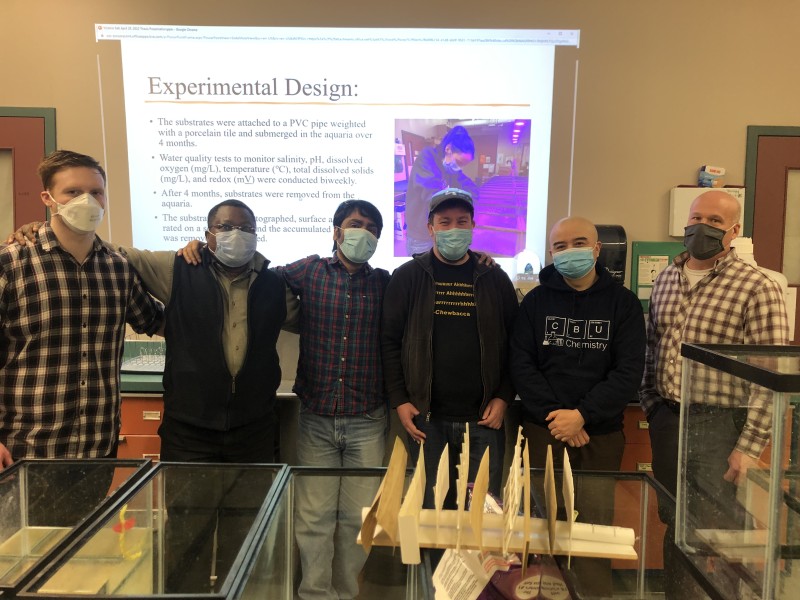CBU Studies Global Marine Challenge
 An impressive group of partners are pooling their expertise to examine a global concern for the marine ecosystem. CBU’s Dr. Ken Oakes, Associate Professor of Biology; Dr. Xu Zhang, Canada Research Chair in Healthy Environments and Communities, Tier II; and Dr. Martin Mkandawire, Professor of Chemistry, caught the attention of the National Sciences and Engineering Research Council (NSERC) with their recent application for an Alliance Missions Grant. Their project, Enhancing Maritime Industry Resilience and Sustainability by Development of Non-toxic Anti-Fouling Marine Coatings, was awarded $360,000 from NSERC to research non-toxic coatings to prevent biofouling. Biofouling occurs when bacteria stick to the waterline surfaces of marine vessels and fishing gear, creating a welcoming environment for unwelcome species like barnacles and mussels. This creates problems for the transportation and aquaculture sectors.
An impressive group of partners are pooling their expertise to examine a global concern for the marine ecosystem. CBU’s Dr. Ken Oakes, Associate Professor of Biology; Dr. Xu Zhang, Canada Research Chair in Healthy Environments and Communities, Tier II; and Dr. Martin Mkandawire, Professor of Chemistry, caught the attention of the National Sciences and Engineering Research Council (NSERC) with their recent application for an Alliance Missions Grant. Their project, Enhancing Maritime Industry Resilience and Sustainability by Development of Non-toxic Anti-Fouling Marine Coatings, was awarded $360,000 from NSERC to research non-toxic coatings to prevent biofouling. Biofouling occurs when bacteria stick to the waterline surfaces of marine vessels and fishing gear, creating a welcoming environment for unwelcome species like barnacles and mussels. This creates problems for the transportation and aquaculture sectors.
“Marine biofouling affects the hydrodynamics of a ship’s hull, reducing speed while increasing fuel consumption and associated emissions by as much as 20 per cent, while increasing production costs for fish harvesters dealing with fouled gear by about the same amount,” explains Dr. Oakes. “Biofouling is currently managed by using highly effective metal-based compounds, but this effectiveness comes with an environmental price – the leaching of toxic metals into the ecosystem.”
Kshitij C Jha, founder of Kavacha, a Prince Edward Island company looking to repurpose marine waste to address biofouling, was eager to join the project team. Kavacha’s work was first recognized during the Ocean Startup Challenge in 2020. They were selected from 170 applicants to receive the Impact Award for presenting a promising technology aiming to remove plastics and pesticides from fishing and shipping applications. “It’s an amazing opportunity to further develop and commercialize an alternative to heavy metal-based paints while reducing the environmental impacts of existing approaches,” says Jha.
The NSERC funding was awarded based on the project’s capacity for research collaboration, forming partnerships between private, public or not-for-profit sectors and academics. Together with colleagues from St. Francis Xavier University, Dalhousie University and Memorial University as well as industry partners, the team will explore the use of biopolymers – organic materials that may offer an alternative to toxic marine paints.
Dr. Zhang, with an extensive research portfolio in nanotechnology, informs the project from that lens. “We talk about using antimicrobial biopolymers and novel nanomaterials and while these concepts may be difficult to understand, the potential for environmental and financial benefits is very easy to recognize,” says Dr. Zhang.
This is not the first project that has brought this team together. Dr. Mkandawire says the team’s approach continues to provide personal and professional rewards. “The more we work together, the more streamlined our efforts become, allowing us to use our collective expertise and resources for maximum effect,” he says. “It’s also a network that offers encouragement and respect, which is very motivating in research.”
CBU and Kavacha sparked conversations with project partners across three Maritime provinces before even applying for funding. Ongoing conversations within research networks across campus and beyond are a constant at CBU. Clean Valley, a Nova Scotia company offering nature-based solutions for the aquaculture and medical fields, and Zero Waste Farms in Newfoundland are also industry partners on the project.
Sarah Conrod, Manager, Industry Partnerships & Research Commercialization at CBU, says this deep dive into marine biofouling is poised to address important economic and environmental challenges.
“This research not only has the potential to have positive environmental impacts but will support Atlantic companies in the transportation and aquaculture sectors, which are key economic drivers in Atlantic Canada,” says Conrod. “It’s exciting to see how a commitment to collaboration can provide such impactful opportunities for growth and development.”
The project will be conducted over two years and will offer opportunities for research assistants and graduate students to work in CBU’s Water Treatment and Environmental Remediation (WaTER) lab, where much of the research will take place.
Congratulations to the CBU Team for receiving this investment of funds and strengthening a research network that is sure to make a difference!